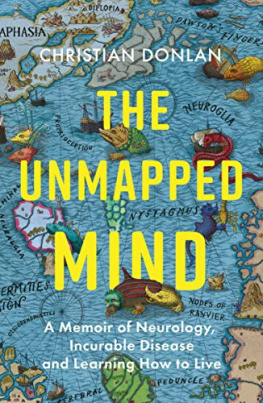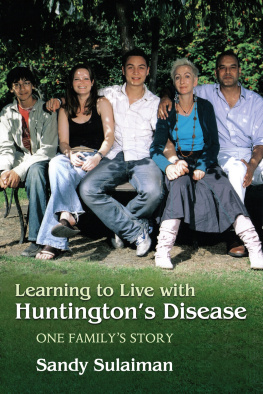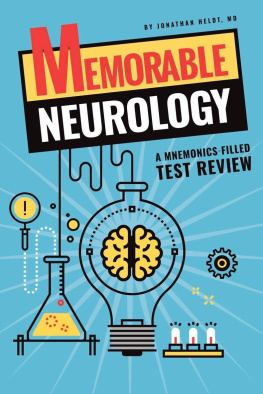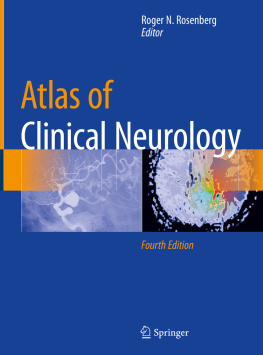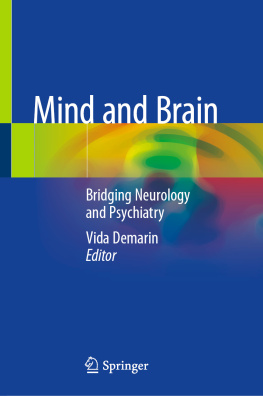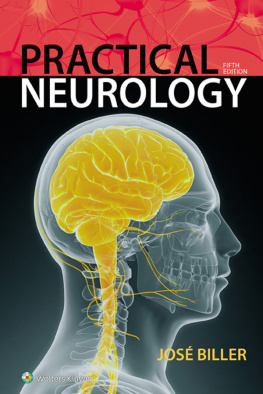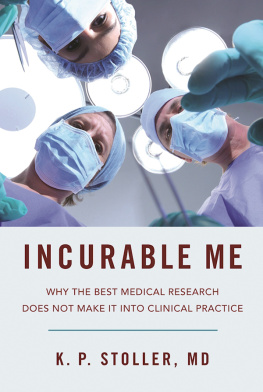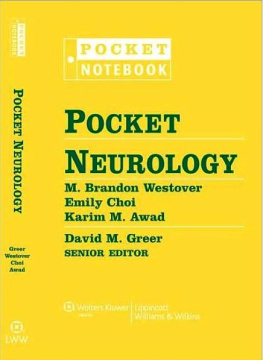Christian Donlan - The unmapped mind : a memoir of neurology, incurable disease and learning how to live
Here you can read online Christian Donlan - The unmapped mind : a memoir of neurology, incurable disease and learning how to live full text of the book (entire story) in english for free. Download pdf and epub, get meaning, cover and reviews about this ebook. year: 2018, publisher: Penguin, genre: Science fiction. Description of the work, (preface) as well as reviews are available. Best literature library LitArk.com created for fans of good reading and offers a wide selection of genres:
Romance novel
Science fiction
Adventure
Detective
Science
History
Home and family
Prose
Art
Politics
Computer
Non-fiction
Religion
Business
Children
Humor
Choose a favorite category and find really read worthwhile books. Enjoy immersion in the world of imagination, feel the emotions of the characters or learn something new for yourself, make an fascinating discovery.
- Book:The unmapped mind : a memoir of neurology, incurable disease and learning how to live
- Author:
- Publisher:Penguin
- Genre:
- Year:2018
- Rating:5 / 5
- Favourites:Add to favourites
- Your mark:
- 100
- 1
- 2
- 3
- 4
- 5
The unmapped mind : a memoir of neurology, incurable disease and learning how to live: summary, description and annotation
We offer to read an annotation, description, summary or preface (depends on what the author of the book "The unmapped mind : a memoir of neurology, incurable disease and learning how to live" wrote himself). If you haven't found the necessary information about the book — write in the comments, we will try to find it.
Christian Donlan: author's other books
Who wrote The unmapped mind : a memoir of neurology, incurable disease and learning how to live? Find out the surname, the name of the author of the book and a list of all author's works by series.
The unmapped mind : a memoir of neurology, incurable disease and learning how to live — read online for free the complete book (whole text) full work
Below is the text of the book, divided by pages. System saving the place of the last page read, allows you to conveniently read the book "The unmapped mind : a memoir of neurology, incurable disease and learning how to live" online for free, without having to search again every time where you left off. Put a bookmark, and you can go to the page where you finished reading at any time.
Font size:
Interval:
Bookmark:
This memoir began life as a book review. It probably would have stayed in that form if not for Helen Lewis and Xan Rice at the New Statesman. Many thanks for their intervention, and for the permission to use excerpts from two of my New Statesman pieces: The Alphabet of Months and A Day Out to an Offshore Wind Farm on a Boat Called Defiance.
My eternal thanks to Sam Copeland and all at RCW, and to Venetia Butterfield, Isabel Wall, Poppy North and everyone at Penguin. Thanks for your patience and generosity and kindness and insight. Thanks to the wonderful Jean Garnett at Little, Brown and to Caroline Pretty, who caught the word impedimenta before I used it incorrectly in print, but agreed that it was a beauty anyway.
Regarding neurological matters, thanks to Dr Omar Hafeez-Bore, Dr Bazo Raheem, Dr Richard Nicholas, Dr William Richardson and Aleksandra Herman. Thanks to David Colhurst and the work of his students. Thanks also to Andrea Lisher, Jenna Mahoney and everyone at the MS Society. All errors in the discussion of brain science in this book are mine and mine alone.
Thanks and love to Simon Parkin, Will Porter and Keith Stuart, to Matt Milne, Nathan Ditum, Pat Tod, Michael Gapper, Michael Cook, Alexis Kennedy, Brian Hampton and to Adam Shaw. Thanks to Jonathan Davis, Stuart Pearce and Alasdair Boreham, to Charles Sabine, Jason Killingsworth, Darren Garrett, Sally Clayton, Nick Sheerin, Joe Skrebels, James Smythe and Craig Owens. Thanks to Andy Farrant and Rachel Weber. Thanks to all at Failbetter Games and all at Ubisoft Reflections. Thanks to Ken Moffat. Thanks to Gazebo Mondrian.
Thanks and endless admiration to the NHS. Particularly, thanks to Jonathan Knibb, Leonora Fisniku, Nadia Abdo, and Anna, Kate and Giles. Thanks to Jocelyn. Thanks to Waqar Rashid. Thanks to the locum who was certain I had GuillainBarr syndrome and the registrar who explained very recently that the brisk swooshing noises I sometimes hear in my head might be the sounds of blood flow that we learn to ignore in early childhood, returning suddenly through the intervention of MS.
Thanks to Martin, Oli, Wes, Rupert, Ellie, John, various Chrises, Tom, Bertie, James G., Matt, Aoife, Johnny, Ian, Rich and everyone at the Gamer Network.
Thanks to my glorious and enormous family, in particular my sister Janey. Thanks to Barbara and Gerald Halsey.
Thanks and limitless love to Sarah Lea and Leontine Maple. There are no words for this feeling, and there never were.

I have never really liked the fact that I have a brain. The thought of it has always made me feel vulnerable and compromised and delicate, as if I were walking around with a glass of water balanced on my head, waiting for it to spill. And I now suspect that I am not entirely alone in this. When, recently, my daughter, Leon, first became aware of her own brain when she first noticed the presence of her thoughts sounding inside her head she assumed she was unwell.
One evening a few weeks back, I was drawn through the house by sudden sobbing. After Id found Leon crying in the living room, and after Id wiped her nose and pinned back her hair, she told me, with much floundering and fumbling to get the meaning out, that she had pictures stuck in her head and she didnt know why.
The pictures made her happy, she said. They were mainly pictures of Lego bricks, cluttered and colourful, spread across the floor of the living room. But she didnt understand where these pictures had come from, and they didnt seem to be going anywhere in a hurry. Now she was scared that she would always have pictures of Lego bricks stuck in her head. I think she even worried there might be a real brick or two lodged in there.
Leon was nearly four by the time of this revelation, and as soon as she understood that the pictures were called thoughts, and that thoughts are a very normal kind of magic, we decided to conquer this new information in the most direct manner we could both imagine. I sketched the basic perimeter on a piece of paper, and then my daughter took twenty minutes to draw a map of the kind of landscape that this book explores. Its a map of the interior of the skull, a map of the beautiful, maddening, difficult place that thoughts come from. Except, because she was nearly four, the picture Leon drew is filled with features that do not appear in most neurological textbooks. There is a lot of lava inside her skull, apparently, and at least one waterfall. There are a surprising number of ponies knocking about too.
I was not surprised that this map helped to calm her down. When I was young, maps and stories were inseparable. Every book I read seemed to come with an outline of the territory that it covered laid out across the endpapers, and every atlas I owned was dense with little figures and scenes waiting to explain the history of an island or to give shape and weight to the science throbbing away beneath the pale surface of an ocean. The adventures I liked did not always require opposition I was a nervous child and easily frightened but they did require a journey, a sense of movement through a landscape cluttered with strange, promising names and the suggestion of sights that might be worth a visit.
A map is an adventure, but if you are nervous and easily frightened it is also a comfort. I could look at the map before reading a book and get a sense of the kinds of elements it would contain the rough shape of the story, and perhaps a limit to its potential to scare me. Maps were a means of fixing things in place and making them safe.
An obvious question emerges from this, and I have been turning it over for the last few years. What does it mean to explore a terrain that resists most attempts to document it? What does it mean to find yourself without a map?
I know a few places like this, I think, and one of them is intimately bound up with Leon and those Lego bricks. Since the early days of our relationship, whenever the weekend came around, with Sarah still sleeping, Leon and I would get up together and head to the living room, where we would upend the Lego box. We would listen to that great collapsing splash that Lego creates when it moves en masse and then, Leon balanced in my lap, I would build. We would build. One piece connecting to another. Toys she was far too young for and I was far too old for. Toys that were suddenly perfect for both of us.
In my memory, this ritual started just months after Leon was born, as soon as she entered that glorious age when every experience is worth having. Your job, as a child, is to have no job. Your job as a child is to be roving eyes and roving hands. The world is a thing to be examined closely, and then it is a thing to be grasped. Our time with the living-room Lego feels idyllic when I look back on it now. Maybe it is suspiciously idyllic. Sometimes I will tell this story to someone else and they will raise an eyebrow, unconvinced, and it will dawn on me that what I am telling them is not quite the whole story that there is a more interesting aspect to our Lego mornings, and I have slowly, steadily, forgotten it.
I have forgotten that, for many months, it was me doing all the building. I think Leon just snoozed at first, strapped into a bouncy chair. As time passed, she would be a warm weight in my lap while my arms reached around her for bricks, her fragile head resting under my chin. Sometimes, she would tap her fingers on her palms with that look of amused indulgence that children often adopt when confronted with the behaviour of adults. And the behaviour she was witnessing is pretty simple for me to decode, frankly. I was Leons father, but I did not know how to be myself around her. I did not know how to play with her yet, or even if she
Font size:
Interval:
Bookmark:
Similar books «The unmapped mind : a memoir of neurology, incurable disease and learning how to live»
Look at similar books to The unmapped mind : a memoir of neurology, incurable disease and learning how to live. We have selected literature similar in name and meaning in the hope of providing readers with more options to find new, interesting, not yet read works.
Discussion, reviews of the book The unmapped mind : a memoir of neurology, incurable disease and learning how to live and just readers' own opinions. Leave your comments, write what you think about the work, its meaning or the main characters. Specify what exactly you liked and what you didn't like, and why you think so.

